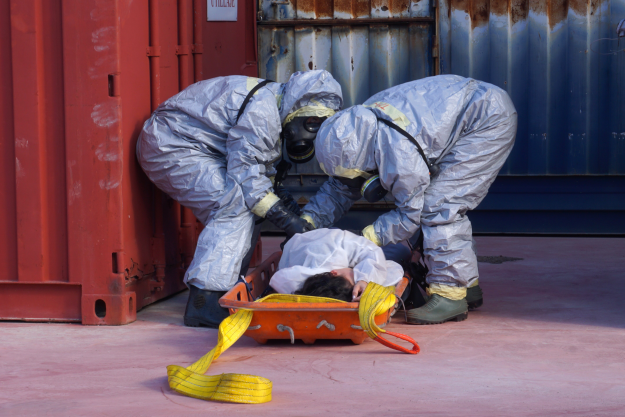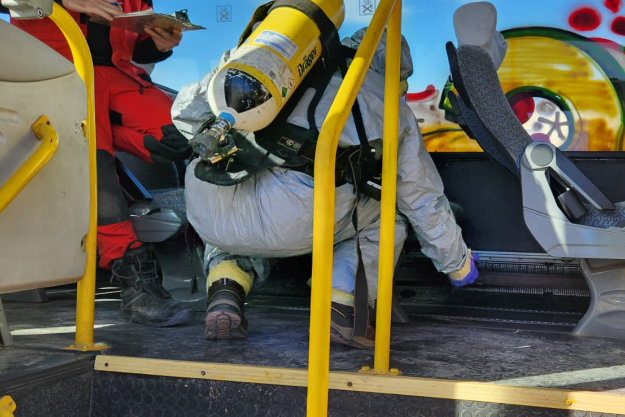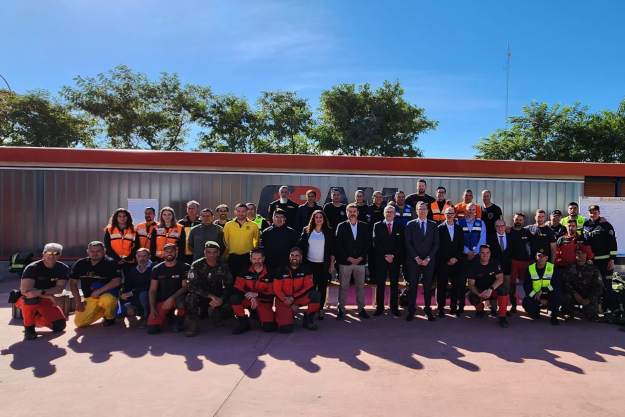THE HAGUE, Netherlands-22 November 2022- Effective response to chemical threats requires well-trained first responders to be prepared to handle incidents ranging from chemical terrorism in public spaces to spills in urban infrastructure. The Organisation for the Prohibition of Chemical Weapons (OPCW) provides advanced trainings to equip responders with the knowledge and skills to handle diverse scenarios related to chemical emergency response.
The OPCW, the government of Spain and the City Council of Murcia, jointly organised an Emergency Response Course Involving Toxic Chemicals in Unconventional Environments for States Parties from Latin America and the Caribbean from 6 to 10 November in Murcia, Spain. During the course, 18 experienced emergency response officers tackled advanced scenarios concerning chemical warfare agents and industrial chemical incidents.

The training gave participants first-hand experience related to chemical incident response in a range of non-conventional enclosed and open environments. Participants planned and executed responses to four different scenarios with the aid of live chemicals and using full protective equipment. These scenarios included toxic chemical incidents in an industrial area and in underground parking, chemical terrorism in a water treatment plant, and in public transportation. The scenarios challenged participants with the intricacies of both responding to and managing the incident, decision-making, and collecting samples in open-air and enclosed places. Each scenario had distinct challenges regarding the evacuation of civilians, contamination containment, and communications.
The Mayor of Murcia, José Ballesta Germán, presided over the closing event and highlighted: "Such trainings are vital to the exchange of information, training, and good work practices between experts from different regions. We applaud the dedication and commitment of our first responders to be prepared to best serve society by honing their skills in this regard."

As part of the training, participants attended practical demonstrations and theoretical briefings on best practices concerning decontamination, detection of chemicals, and incidents involving chemical warfare agents and toxic industrial chemicals. The course also supported the exchange of information and fostering networking among the participants, as it brought together experts from across the region.
The 18 participants represented 10 OPCW Member States: Argentina, Brazil, Chile, Colombia, Costa Rica, Cuba, Ecuador, Panama, Paraguay, and Uruguay. The closing was further attended by Fernando Borreda, Secretary of the Spanish National Authority for Prohibition of Chemical Weapons, and councillors of the Murcia municipality.
The training took place thanks to funding and training support from the Murcia Fire Brigade with further training staff and support from the Spanish National Police and Murcia Region Fire Brigade.

Background
Article X provides for assistance and protection to a State Party if it is attacked or threatened with attack by chemical weapons.
The training constituted a Specialised Training Programme, capacity building measures that fall outside of routine training and aim to practice and reinforce previously acquired programmes.
As the implementing body for the Chemical Weapons Convention, the OPCW, with its 193 Member States, oversees the global endeavour to permanently eliminate chemical weapons. Since the Convention's entry into force in 1997, it is the most successful disarmament treaty eliminating an entire class of weapons of mass destruction.
On 7 July 2023, the OPCW verified that all chemical weapons stockpiles declared by the 193 States Parties to the Chemical Weapons Convention since 1997 - totalling 72,304 metric tonnes of chemical agents - have been irreversibly destroyed under the OPCW's strict verification regime.
For its extensive efforts in eliminating chemical weapons, the OPCW received the 2013 Nobel Peace Prize.






